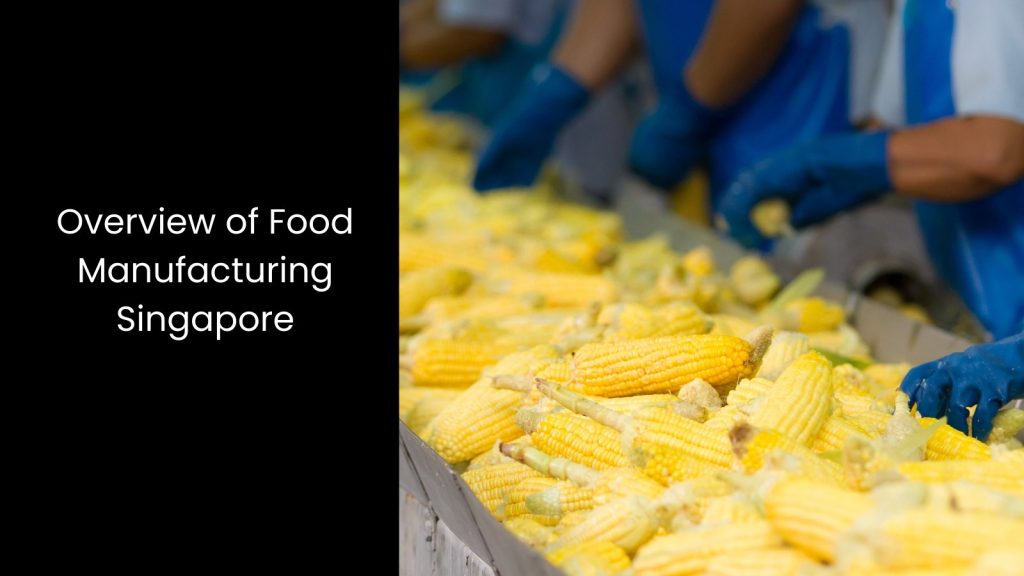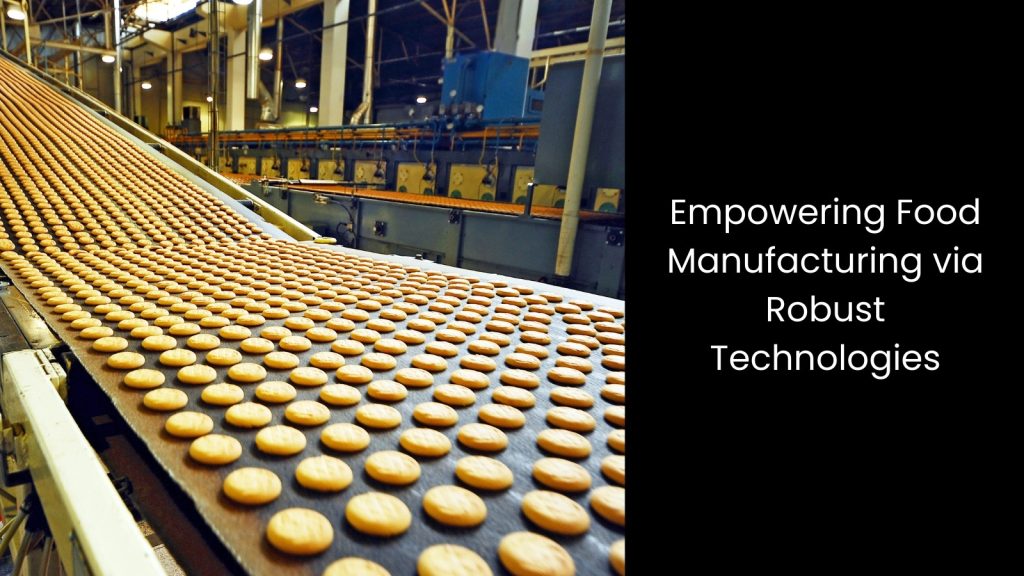We will find the answer to this as we understand the future potential of food manufacturing Singapore in this article.
Overview of Food Manufacturing Singapore

- Did you know that the Singapore Food Manufacturers Association has a long list of manufacturing companies in Singapore? The country is proud to have over 2,100 food processing and production companies up to date.
- Also, it is a well-known fact that Singapore’s food manufacturing industry is a major player in producing high-quality food that meets safety standards for both local and global markets. Food manufacturing Singapore is enriched with multinational corporations (MNCs), home-grown brands, and an increasing number of innovative food-tech startups, all benefiting from Singapore’s robust business ecosystem.
- Back in the recent past, the food manufacturing sector employed over 50,000 people and generated more than S$10.7 billion in revenue, with nearly 60% of that being exported worldwide. As part of its efforts to stay competitive on the global stage, Singapore’s Food Manufacturing Industry Transformation Map (ITM) seeks to position the country as the leading food and nutrition hub in Asia, supporting local companies in becoming internationally competitive.
- Today, many consumers are more concerned about their food choices’ nutritional content and environmental impact. In fact, 73% of Singaporeans want to know more about the brands they purchase, and 80% are willing to pay a premium for products with a lower carbon footprint. To thrive in this fast-evolving industry, local food manufacturers must embrace digital technologies to improve productivity, reach new customers and make data-driven decisions.
What will the Future of Food Manufacturing Look Like?

Emerging of 3D Food Printing
This innovative approach allows food manufacturers to create custom-designed food items with unique shapes, textures, and flavours, offering endless possibilities for the industry. As the technology develops, food manufacturing companies in Singapore could harness it to produce highly personalised food products tailored to individual nutritional needs or dietary preferences, opening doors for healthier and more diverse options in the market.
Additionally, 3D printing enables alternative ingredients, like plant-based proteins or functional ingredients, to be integrated seamlessly into food products. In a country like Singapore, known for its focus on food innovation and sustainability, adopting 3D food printing could reduce food waste by allowing manufacturers to print precise amounts of food, minimising excess and spoilage. This technology also allows food manufacturers to create visually stunning and intricate designs, giving products a unique appeal that could attract local and global customers.
With this technology, Singapore’s food manufacturers are well-positioned to stay ahead in an increasingly competitive global market by providing innovative, customised, and eco-friendly food solutions that cater to modern consumer trends.
Spreading Food Waste Reduction Technologies
One of the most promising developments is upcycling, where food waste such as fruit pulp, vegetable peels, or leftover grains is repurposed into new products like snacks, beverages, or ingredients for other food items. This not only reduces waste but also creates new revenue streams from materials that would otherwise be discarded.
In another way, Artificial intelligence (AI) is becoming a powerful tool for predicting demand and optimising supply chains, helping food contract manufacturing Singapore domain more accurately forecast production needs and reduce overproduction. As it is possible to use AI to analyse consumer behaviour and market trends, a food company can adjust the production processes in real-time, ensuring that they produce only what is needed and prevent excess food that ends up being wasted.
Technologies that enable efficient sorting and processing of food scraps for composting are also becoming more common, helping companies manage organic waste responsibly. As more people demand environmentally friendly products, Singapore’s food manufacturing sector embraces these technologies to stay competitive while being socially responsible.
Implementation of Smart Kitchens and IoT Integration
Regarding food contract manufacturing Singapore, smart kitchens use sensors, AI, and automation to monitor cooking, processing, and packaging in real-time, improving quality and consistency in every product.
Plus, IoT devices allow machines and appliances to communicate with each other, enabling seamless coordination across production lines. By analysing data collected from each stage, companies can make quick adjustments to reduce waste and energy usage, achieving more sustainable practices. With IoT-enabled monitoring, food manufacturers can immediately detect issues, such as contamination risks or equipment malfunctions, which improves food safety and minimises downtime.
As smart kitchens and IoT evolve, they will help food manufacturers in Singapore keep pace with rising industry standards and consumer expectations for quality and transparency, setting new benchmarks for productivity and innovation in food manufacturing.
Automation and Robotics in Food Production
Automated systems improve consistency in food processing, ensuring every product meets strict quality standards. Robotics also enhances workplace safety by handling dangerous or physically demanding tasks, which lowers accident rates and creates a safer environment for employees.
Another thing is that automation enables faster production, meeting the growing demand for food products without compromising quality. As companies adopt more advanced robotics, they create new opportunities in food manufacturing jobs in Singapore, including roles in robot maintenance, programming, and data analysis. This shift drives a need for skilled workers who can manage and operate automated systems, providing Singapore’s workforce opportunities to upskill in robotics and technology.
Cerexio IoT Integration System for Optimised Food Manufacturing Process

If you are looking for innovative ways to optimise a food factory in Singapore, Cerexio has outstanding solutions like an ‘IoT Integration System’ to enhance production through real-time data monitoring and predictive insights. This system connects machines, tracks performance, and anticipates maintenance needs, reducing downtime and ensuring consistent product quality. With Cerexio, Singapore’s food manufacturers achieve efficient operations, minimise waste, and meet high safety standards, boosting productivity across the industry.
Empowering Food Manufacturing via Robust Technologies

Not to mention that the journey toward tech-driven food manufacturing in Singapore unfolds endless potential, transforming the industry with every breakthrough. Each robust technology enables seamless operations, high-quality standards, and meaningful sustainability efforts. If a food company can embrace these innovations, it will not just stay competitive but also nurture a resilient industry that can adapt to changing needs and inspire future possibilities.
